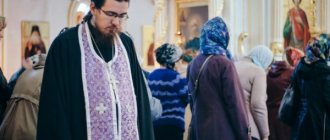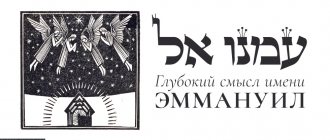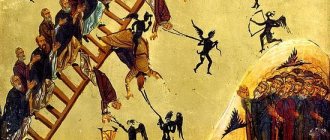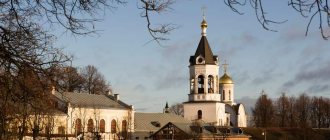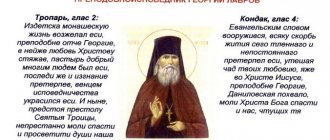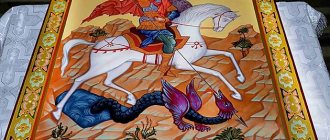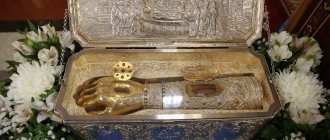Archpriest Georgy Tofilyuk: “Orthodoxy in Poland is often perceived as a legacy of Russia”
The first question I asked the rector concerned individual milestones of his life and ministry.
– How did it happen that a man born in a purely Catholic country became an Orthodox clergyman?
“I was born into an Orthodox family, all my ancestors were Orthodox,” answers Father George. – My father is an Orthodox priest. I was born in western Poland, but lived in the east, in Hainowka, where almost half the population is Orthodox. So I did not convert to Orthodoxy; I have been Orthodox since birth. Next is the usual path of life. Graduated from primary school and secondary lyceum. Then he received his theological education at the seminary (formerly there was an Orthodox seminary in the Yablochinsky monastery) and the Christian Academy in Warsaw. He was ordained to the priesthood in 1981, at the age of 24.
– Did you initially intend to choose the path of the priesthood?
- No. There was no such desire right away. Moreover, in my youth I had a more mathematical than humanitarian mindset. But around the age of 16-17, I decided to go to seminary. And he entered there at the age of 19.
“The problem, in my opinion, is the current too close ties between the Church and the state - I think this is not useful for the Church”
– Father George, in one of your interviews – more than 13 years ago – you expressed the opinion that Polish Catholicism has run out of steam. Do you think it is possible to speak in the same vein now? If yes, what is the reason? Is Catholicism theologically exhausted? Due to staff shortages? Or perhaps the situation in Poland is now completely different from what it was 13 years ago?
– I don’t think that Polish Catholics have a problem with personnel. The Catholic Church has a sufficient number of clergy here. The problem, in my opinion, is the current too close ties between the Church and the state - I think this is not useful for the Church. Overall, the Catholic Church in Poland is strong – as an organization and also politically. And more politically than spiritually. Although it is not weak in terms of spirituality, there are spiritually rich parishioners in the Church. Now Catholics are increasingly active in serving akathists, writing icons, and translating Church Fathers. It is noticeable that the theological thought of the East, that which is associated with Eastern piety, becomes closer and dearer to them.
– Such interest cannot but be welcomed. However, as far as I know, passion for Eastern theology is not yet particularly conducive to the transition of Polish Catholics to Orthodoxy?
- No. And I'm afraid this is hardly possible. Orthodoxy in Poland is often perceived as a legacy of Russia, as what remained after the divisions of the Polish-Lithuanian Commonwealth, when Poland did not exist at all. There is an idea in the country that an Orthodox is a Russian, a Pole is a Catholic, and a Protestant is a German. All this remains in the subconscious of people. Maybe not to the same extent as it was before, but it still remains... Or this point: why did Russification fail in Poland in the 18th-19th centuries?
– Do you think it’s because of the influence of the Roman Catholic Church?
- Yes. And the feelings of the people. Look at the aristocratic names - Sapieha, Khodkevich. These are Orthodox Christians who became Poles and Catholics. Many Poles became Germans and Protestants. But in the opposite direction, for large aristocratic families to become Russian (Orthodox), there was no movement. Unfortunately, in the minds of the Polish people, the attitude towards the Russian nationality remains as “bad” compared to the Polish one... As for the current situation, another difficulty lies in the fact that the Orthodox Church in Poland performs services in the Church Slavonic language. There are only three parishes in the entire country where they serve in Polish. Too few. The Church Slavonic language is incomprehensible to the Poles, and they will not make an effort to learn it. Yes, in our church Polish is used in preaching and communication, but there is no widespread movement to translate services into Polish.
- Why? Perhaps the majority of believers are still satisfied with Church Slavonic as the language of worship?
– Many Orthodox Christians in Poland do not consider themselves Poles. They are citizens of Poland, but by nationality they are Belarusians, Ukrainians, Russians...
Archpriest Georgy Tofilyuk and Sergey Mudrov
– So there is still a problem of divided identity? A Pole is associated with Catholicism, and if a person is not a Catholic, then he is not a Pole, but a Russian, Belarusian, Ukrainian?
- Absolutely right. “Tuteishy”, as they used to say. Local. I think it still exists.
– Do you think this situation can be changed? Make sure that the Polish Orthodox Church becomes “our own” for the ethnic Pole, and ceases to be something foreign or of another nationality. So that a Pole understands that he can remain a Pole, even if he converts to Orthodoxy.
– Such changes are possible. And now there are Orthodox Christians who consider themselves Poles, including priests. However, many problems remain related to the clash of two cultures, two worldviews. On our part, the pre-war times are fresh in our memory, when there were persecutions of Orthodox Christians in Poland, churches were destroyed, and it was impossible for Orthodox Christians to find work. It cannot be said that enmity remains, but there is some tension on a subconscious level. Let me give you one example. A new Orthodox church was being built in Warsaw - the first church in the 21st century. Architecturally, it resembles the Church of Hagia Sophia in Istanbul. And then someone drew a pig on the fence there and the inscription “out” appeared. That is, people perceive our temple as something alien to them...
-Did you draw a pig? But why? Did you think that a mosque was being built?
– There was no cross on the building yet, but everyone knew that it was not a mosque – the newspapers wrote about it.
– And the local residents, knowing that a Christian, Orthodox church was being built, drew a pig and wrote “out”?
- Yes.
– What kind of paradox? Some kind of association between Orthodoxy and Islam?
- Hardly. I think there is a problem here of encountering an “alien.” Look, we in Poland do not want to accept all migrants. Everything that is foreign and unfamiliar is no longer the same.
- So, the protest could only be because this church building is not a Catholic church. In other words, what is considered foreign to a Pole?
- This is true. Even if we take our seminary, not everyone knows and understands what an “Orthodox seminary” is. Sometimes there are puzzled looks and questions. Still, it is noticeable from the behavior of the Poles that the so-called multiculturalism has not taken root here.
Warsaw Theological Seminary building
– On the other hand, the European Union is actively promoting multiculturalism, because this is one of the components of Brussels’ policy...
- You're right. But Poland strives to preserve its identity, sometimes despite the decisions of the European Union. Not all Brussels initiatives are welcomed in Warsaw; their implementation is sometimes difficult.
Apologetics and mission
Having discussed issues of identity and multiculturalism, I take our conversation in a slightly different direction. Graduates of an Orthodox seminary inevitably have to decide on such an important issue as their attitude towards the Catholic majority (and a dominant and very active majority). What role does the rector see for himself in this regard, how does he perceive Catholics in general, and what does he teach students? Taking another sip of aromatic seminary coffee, I moved on to this difficult and sometimes painful (for some) question.
“Probably, I have never been a preacher of Orthodoxy in the Catholic Church,” admitted Father Rector. – Moreover, I also teach at a Catholic seminary and a Catholic university. I work rather in the spirit of cooperation, ecumenism, and do not believe that the Orthodox should fight with the Catholics.
– Father George, but you know very well that in Orthodoxy two opposing opinions coexist. On the one hand, there are theologians who claim that the Catholic Church in the 11th century broke away from the united Church of Christ and is now in schism. There is another position: the Catholic Church is proclaimed almost a “sister church” in relation to Orthodoxy. What is your opinion?
– I do not believe that the Catholic Church is in schism in relation to us. In my opinion, the break occurred not in the 11th century, but in the 13th century, when the crusaders captured and plundered Constantinople. Regarding the theological view of Catholicism, I would like to first ask the question: what is theology? This is not just theoretical reasoning; This is, first of all, practical life, prayer. If we considered Catholics schismatics and heretics, we would not recognize their sacraments. But we recognize the baptism of the Catholic Church. Yes, on Mount Athos this baptism is not recognized, but this is their view. I believe that the Roman Catholic Church remains the Church. I do not exclude the possibility that salvation can be obtained in their Church. And I dare not say that Catholics have no grace.
– Then the next question arises. If Catholics also have grace, is the mission of the Orthodox Church necessary in Poland? If so, who will it be for?
– What do you understand by missionary? Preaching Orthodoxy in front of a Catholic church?
“I do not dare to say that only we, the Orthodox, have salvation”
– I think it’s problematic to do this. The mission should probably be different: not to hide the differences that exist between Orthodox and Catholics, not to say that we are the same, not to talk about supposedly equal paths to salvation...
– I do not dare to say that only we, the Orthodox, have salvation, and Catholics do not. But this does not mean that we hide differences. Still, these are different things. I teach comparative theology and, of course, I talk to students about the differences between Orthodoxy and Catholicism, and I also communicate with Catholics on this topic. In such conditions it is possible to conduct a non-aggressive mission. If I do not deny the possibility of salvation for Catholics, this does not mean that I equate the Orthodox and Catholic Churches. If I put an equal sign, I would not be an Orthodox priest. I understand that for us Orthodox it is easier to find salvation, that we are right in our faith. I explain why we reject the primacy and infallibility of the Pope, why there is a filioque problem, why we have a different understanding of the sacrament of marriage. We do not hide our differences, but still I do not dare to say that all Catholics will be condemned because of their membership in the Catholic Church.
About the structure of the seminary
Having heard Father Rector’s opinion about Catholics and the Church, I decided to conclude this difficult topic. Many copies have been broken in discussions between the conservative and liberal wings of Orthodoxy, but apparently, there is unlikely to be any common ground here. In any case, working, teaching and evangelizing in a non-Orthodox country, when more than 90% of the believers around are Catholics, is more difficult than in an Orthodox country, even with nominally Orthodox believers. It is clear that now the main mission of the Warsaw Seminary is not the conversion of Catholics to Orthodoxy, but the preparation of pastors for the Polish Orthodox flock and, possibly, the flock of some neighboring countries, whose hierarchs are ready to send their children to study in Warsaw.
“Now our education is entirely in Polish, there are few students from abroad,” says Father George. – There are guys from Ukraine and Lithuania. Previously, there were seminarians from Bulgaria, Georgia, and Brazil. People came from Belarus, of course, to study, but lately there haven’t been many students – perhaps now the Belarusian hierarchy is more skeptical about the idea of studying abroad. In this regard, the position of Bishop Artemy of Grodno remains invariably positive, which is why people are coming to us from the Grodno diocese. However, this year there are no Belarusian students in the seminary.
– Does the financial factor matter here? Or are the costs of studying for foreign (and local) students not very high? As far as I understand, there is no tuition fee, room and board is provided?
– Training is free, but students pay for maintenance. Now there are 60 students in the seminary, of which 11 people permanently live on site, in the seminary building. The rest study on an individual schedule. They usually come once a month for a week and live with us. The training lasts three years, after which graduates receive a bachelor's degree in theology.
– What topics (areas) of theses are most popular among students?
– On history and patrolology. The teachings of the Church Fathers and saints. Sometimes moral theology. Almost no one writes works on dogmatics.
– What next, after seminary? For example, a graduate wants to study science, but at the same time knows that there is no Orthodox theological academy in Poland?
– Here the options are the following: go to study abroad or enroll in a master’s program at the Christian Theological Academy in Warsaw.
– But the Christian Academy is still not an Orthodox educational institution.
– This is true, but there is a certain gradation in the academy. For example, philosophy is a single course for all students. And there are courses taught for Orthodox Christians - dogmatic theology, moral theology, comparative theology, theology of the icon. The leadership of the academy is partly representatives of our Church. So, the vice-rector is Archbishop Georgy (Pankovsky), and I head the department of patrolology at the academy. The rector of the academy, Professor Milersky, is a Protestant.
– What percentage of students take holy orders after graduating from seminary?
- Overwhelming majority. 95 percent of graduates become priests.
– And this despite all the difficulties of serving in Poland, including financial ones?
– Yes, seminarians see their calling in the priesthood. Although in Poland, only parishes in large cities can support priests. Priests from small towns and villages (at least some of them) teach the Law of God and are chaplains in prisons or hospitals. The state pays them for this. Otherwise, in most parishes the priests simply would not survive.
– But can the metropolitanate maintain the seminary itself?
- Partially. The metropolis pays for the maintenance of the building, and the state helps with the payment of salaries to teachers (and even then not in full). There are 17 people teaching at the seminary, but 7 are full-time. Many combine teaching at the seminary and the Christian Academy.
– Are there any plans to create an Orthodox Theological Academy, like in Moscow, Kyiv, Minsk, St. Petersburg?
- We can't do this. To create an academy, a minimum of 12 people with the academic degree “doctor habilitated” are needed, and we have about half of the required number. Yes, I’m not sure that we will have anyone to teach. Few people go into theological sciences; humanities are unpopular these days. Therefore, I think the situation will remain as it is now.
Ukrainian question
The Warsaw Seminary willingly accepts students from Ukraine, but only from the canonical Church, now ruled by Metropolitan Onufry. Ukrainian schismatics were never recognized in Poland; however, the new structure, the OCU (Orthodox Church of Ukraine), which received autocephaly from Constantinople, also turned out to be unrecognized by the Polish Church. Father Georgy sees a great misfortune and tragedy in everything that is happening in Ukraine these days, but it is not easy for him to offer some effective recipes for solving this problem.
– In the actions of the Ecumenical Patriarch, I see a violation of the rights of the Russian Church, an invasion of its canonical territory. In the Polish Church we did not recognize the decision of Constantinople to return the holy rank to Philaret and Macarius.
– Apparently, the Ukrainian problem will be mothballed for many years... Just like in Estonia, where two parallel jurisdictions coexist. Moreover, in Estonia there is still mutual rejection and misunderstanding between the EOC of the Moscow Patriarchate and the EAOC of the Ecumenical Patriarchate.
– It seems to me that in Ukraine the issue is also that the people are divided. Western and Eastern Ukraine are two different peoples. The division extends to both the church system and political layers.
– Indeed, the difference by region is very noticeable. According to opinion polls, the creation of a single Orthodox Local Church is supported by 51% of residents of Western Ukraine, while in the East support drops to 25%. More than a twofold gap. The western and central regions are more pro-autocephalist. The eastern and southern regions are configured differently. And this split could not be overcome; it persists.
– Yes, both in politics and in the Church – in everything. Although there was no schism in Poland, the Russian Church did not recognize Polish autocephaly for more than 20 years, until 1948.
– Just in the same year there was a letter of repentance from Metropolitan Dionysius (Valedinsky), one of the initiators of Polish autocephaly, the primate of the autocephalous Polish Church since 1924.
– There was such a letter, but it was not the reason for the recognition of Polish autocephaly in Moscow.
- Maybe. Although the very fact of such a letter is important. After all, they never received repentance from the Ukrainian schismatics in Moscow, neither from Philaret nor from Macarius. However, this is a separate topic... I want to thank you, Father George, for an open and interesting conversation.
- And thank you. Although I see that you did not agree with me on everything, and, probably, not all of my answers satisfied you.
You can applaud the author (at least 10 times)16
A little history
The introduction of Christianity into the territory of modern Poland dates back to 966, during the reign of Mieszko I. Having married the Czech princess Dubravka from the Přemyslid dynasty, Mieszko and his court adopted a new faith in the form of one of the main branches of Christianity - Catholicism. The purpose of this act was not at all to please his wife, but more global: with the help of religion, the Polish king wanted to curb the feudal lords and faith would help gain additional authority and influence.
Christianity was introduced into Poland by Mieszko I
The feudal lords immediately sensed something was wrong and were hostile to Catholicism. Here and there uprisings broke out, churches were set on fire, priests experienced persecution and violence. Despite this, Christianity managed to gain a foothold in the country as the main religion. This was done through the use of brute military force and through loyalty to the Christian religion. Thus, the uprisings were suppressed, and Christian priests assimilated old pagan rituals, introducing them into the new Catholic traditions.
Religious worldview of Poles
Although the Poles are a religious nation, which for the most part frantically performs rituals and attends church on prescribed days, they are still pragmatic believers. Along with piety, there is also selective adherence to dogmas and church truths. For example, most Poles do not share the views of the Catholic Church regarding contraception and, despite its disapproval, use contraceptives.
Poles are religious, but without fanaticism
In recent years, there has been a decrease in the number of parishioners attending church services. There are several reasons for this: firstly, during communism, the forbidden fruit was sweet for the Poles and, despite the taboo, they filled the churches to capacity. Secondly, recently there has been overly zealous cooperation between the church and politicians, which greatly reduces the authority of the church. A striking example of this is the raising in the Sejm of a law banning abortion at the state level, which causes a storm of negative emotions and disapproval among Poles.
Nevertheless, Poland remains a religious nation that has a large number of traditions and religious holidays. Most of all, Poles revere the Mother of God and there is even a truism among them that Poles believe more in the Mother of God than in God himself. The cult of the Mother of God among Poles is so strong that icons of the Diva Mary can be found in almost every home. By the way, if you go back a few centuries, you can see a similar picture. The special veneration of the Mother of God is also evidenced by the fact that in 1656 Jan Casimir proclaimed her Queen of Poland.
Assimilation of paganism into the Catholic religion
Various festivals occupied a special place in the pagan cult: spring holidays, agricultural holidays, and nature cults. Events familiar to pagans were transformed into Christian ones: deities were replaced by saints, and new Catholic holidays were founded at a significant time for farmers.
It is from paganism that the cult of the dead originates. Even the pagans believed in the existence of a soul that lived separately from the body after death and burial. She was revered with great respect, which also carried over into the Christian faith: memorial days were held, flowers and food were brought to the graves of the dead.
Many beliefs and traditions from paganism migrated to Christianity
Along with faith in good gods who do good, there was another - faith in evil spirits who frightened. These characters, who occupied a special place in the life of pagans, were successfully transformed in Catholicism in the form of the devil and his minions. At the same time, a special place in the beliefs of the ancient Poles, like all Europeans, was occupied by sorcerers and witches - people who entered into an agreement with the devil.
To this day, remnants of the pagan faith can be found in rural Poland. These are, in particular, beliefs in brownies, forest spirits, mermaids, ghouls, etc.
